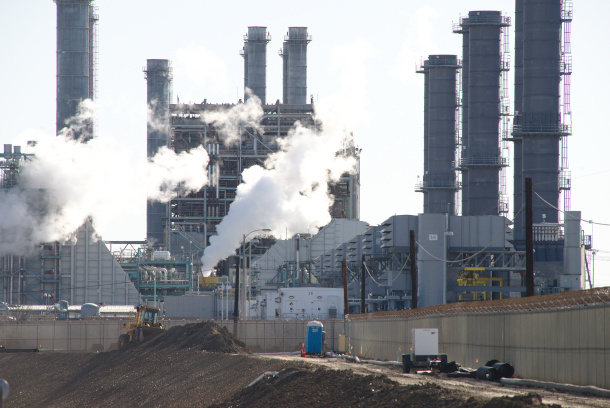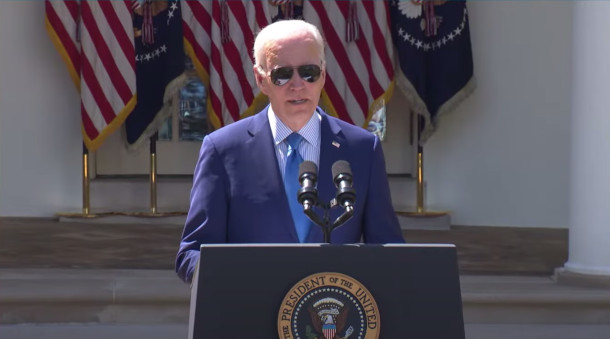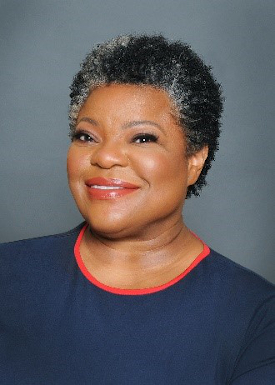Environmental Justice for All of Government
Air Date: Week of May 19, 2023

The Environmental Protection Agency proposed rules that would require all US power plants to reduce or capture 90% of their carbon dioxide emissions by 2038. Pictured above is the Haynes Generating Station in Seal Beach, California. (Photo: Jon Sullivan, Flickr, CC BY-NC 2.0)
The new White House Office of Environmental Justice will oversee EJ efforts in every federal agency. The Biden administration also wants new power plant rules that call for carbon capture and storage technology, which has yet to be proven at scale and could have environmental justice impacts. Monique Harden, Director of Law, and Policy at the Deep South Center for Environmental Justice, joins Host Steve Curwood to discuss these developments.
Transcript
CURWOOD: President Biden recently created the White House Office of Environmental Justice to oversee EJ efforts in every federal agency.
BIDEN: Environmental justice will be the mission of the entire government.
[APPLAUSE]
CURWOOD: The Biden administration also wants new rules that would effectively halt greenhouse gas emissions from coal and gas powerplants by 2040. It calls for expensive carbon capture and storage technology which has yet to be proven at scale and could force the retirement of many coal and gas fired power plants. For more on these developments, we reached out to Monique Harden. She’s the Director of Law and Policy at the Deep South Center for Environmental Justice and joins us now from New Orleans. Welcome back to Living on Earth, Monique!
HARDEN: Thank you, Steve. It's great to be back.
CURWOOD: So why create a White House Office of Environmental Justice now with this federal chief environmental justice officer to be appointed?
HARDEN: I think it recognizes that there's a gap between environmental justice and our environmental laws and regulations. And being able to bridge that gap is, I think, the work of this office. You know, up until now, with previous executive orders that first came from President Bill Clinton, and now the current executive order by President Biden that creates this Office of Environmental justice, we had loose directives to agencies to, quote unquote, address racially disproportionate pollution burdens, but they didn't really have a system that would hold them accountable for how they go about that, and how they show their progress or challenges in a way that can be transparent, and allow for communities affected by pollution, their voice and what those agencies or departments should be focusing on.
CURWOOD: I mean just how much weight and power will this White House Office of Environmental Justice have? I mean, to what extent is symbolic, there's already a White House Environmental Justice Advisory Council that sometimes goes by the acronym WHEJAC, what's new?
HARDEN: What's new is that this White House Office of Environmental Justice has the job of calling all of these federal agencies and departments together to show what they are doing to achieve and ensure and deliver environmental justice for the people in America for communities that are really hard hit by toxic and assaults through pollution, contaminated water, air that's not safe to breathe, you name it. What has happened up until this point, including with the White House Environmental Justice Advisory Council, are recommendations that go out to federal departments and agencies. But that's what goes in, we don't see what comes out. And so what this office will basically ask or direct all these federal agencies and departments to do is really to show their work, if any, on environmental justice and make that you know, available for public review and comment.
CURWOOD: Now, you're an attorney who has pursued a number of environmental justice cases. To what extent do you think this office might help create records that private citizens then would be able to use to advance particular situations that they're concerned about?
HARDEN: I think it would be tremendous in that effort. As you know, much of the work of you know, litigation involving environmental justice, it's all about what's in the record and without a serious approach and rigorous approach to documentation it's hard to fight for the change.

President Biden signed an executive order aimed at embedding environmental justice into the work of federal agencies. (Screenshot: The White House YouTube Channel, Public Domain)
CURWOOD: The Environmental Protection Agency is working on issuing new power plant emissions rules that hinge on carbon capture and storage. Why is the Biden ministration moving in this direction and how does this impact the mission of environmental justice?
HARDEN: It actually gets in the way of the mission of environmental justice because for you know, decades and decades, it's been black and other communities of color, that have been on the frontlines of toxic pollution exposure to oil refining and other oil gas based manufacturing that has been harmful and damaging to our communities. So you know, power plant pollution, we know causes premature death, because of the large emission of particulate matter. With carbon capture and storage, we would be looking at not only more of the same because this carbon capture storage is for new wave of oil, coal and gas operations and industrial facilities. And by itself, this is a process that creates more risks for nearby communities, in terms of the release of carbon dioxide and the process of collecting it from waste gas on an industrial site to the prospect of pipeline transport, where the carbon dioxide can corrode the metal pipelines and cause ruptures or leaks, to the underground injection of carbon dioxide that can find its way out if there are fissures or fault lines or other wells a lot of our wells in Louisiana, for example, are not even documented, unknown not mapped, and from there can break down rocks which would create earthquake the risks of earthquakes seismic activity, as well as contaminate underground water that aquifer systems and all, that our supplies and sources for drinking water. So we're compounding the problem of environmental racism in our communities with carbon capture storage, it's not lessening or mitigating it.
CURWOOD: Well, certainly the science here says that co2 is heavier right than the other molecules in the air. So if it escapes, it would surround a community if it came out of a pipeline or near a plant and of course, there have been accidents along these lines if I understand that correctly.
HARDEN: Yeah, the Startia disaster in Yazoo County, Mississippi is an example of a tragic carbon dioxide pipeline rupture, because cars need oxygen to move. So cars just stopped running. And when emergency responders were able to come to the community to help, they saw it cars just stopped in the middle of the roadways and people passed out in them, because we also need oxygen to breathe. And so this is what more and more CCS would be posing for our communities.

Monique Harden is the Director of Law and Policy and Community Engagement Program Manager at the Deep South Center for Environmental Justice. (Photo: Courtesy of Deep South Center for Environmental Justice)
CURWOOD: A skeptic might say that the carbon capture and storage gambit is something that's in the Inflation Reduction Act, put there to help protect the balance sheets of the fossil fuel companies who can say- see we have a solution, so you can keep investing in us. Our oil and gas reserves do have value because we will be able to use them. To what extent do you agree with that analysis?
HARDEN: Oh, well, I mean, there's no way you can look at carbon capture storage and not be in agreement with that. Right now we have, you know, through the Inflation Reduction Act, a change in our tax code that would allow a company to get a tax credit that's $85 for each metric ton of carbon dioxide, that they believe that they can collect, capture and store underground. Projects that are being proposed. Right Now. These are just proposed stage concepts stake out no less than 1 million to 5 million tons of carbon dioxide. So you multiply at $85 times 1 million or 5 million. And so it's not just maintaining a bottom line. It's really enriching these companies to do what we know is harming our lives and harming our planet. And I think what's underlying all of that is just the power that oil and gas companies have, where they have gone from denying climate change to now proposing false solutions for it.
CURWOOD: How deep do you think the new White House office on Environmental Justice will dig into this?
HARDEN: I think because there's such a growing public demand around carbon capture storage, prohibiting it, making sure that it doesn't come to community, extra community wide or nearby lakes or underground storage, and things of that nature and the distrust that it's been well earned by state agencies, state environmental agencies and agencies dealing with natural resources. It's going to put more pressure on this White House Office of Environmental Justice to really look at the environmental injustice that's posed by these carbon capture storage proposals.
CURWOOD: Monique Harden is the Director of Law and Policy at the Deep South Center for Environmental Justice. Thank you so much.
HARDEN: Thank you, Steve.
Links
Reuters | “Biden’s EPA Proposes Crackdown on Power Plant Carbon Emissions.”
Nature| “Carbon Capture Key to Biden’s New Power-Plant Rule: Is the Tech Ready?”
Living on Earth wants to hear from you!
Living on Earth
62 Calef Highway, Suite 212
Lee, NH 03861
Telephone: 617-287-4121
E-mail: comments@loe.org
Newsletter [Click here]
Donate to Living on Earth!
Living on Earth is an independent media program and relies entirely on contributions from listeners and institutions supporting public service. Please donate now to preserve an independent environmental voice.
NewsletterLiving on Earth offers a weekly delivery of the show's rundown to your mailbox. Sign up for our newsletter today!
 Sailors For The Sea: Be the change you want to sea.
Sailors For The Sea: Be the change you want to sea.
 The Grantham Foundation for the Protection of the Environment: Committed to protecting and improving the health of the global environment.
The Grantham Foundation for the Protection of the Environment: Committed to protecting and improving the health of the global environment.
 Contribute to Living on Earth and receive, as our gift to you, an archival print of one of Mark Seth Lender's extraordinary wildlife photographs. Follow the link to see Mark's current collection of photographs.
Contribute to Living on Earth and receive, as our gift to you, an archival print of one of Mark Seth Lender's extraordinary wildlife photographs. Follow the link to see Mark's current collection of photographs.
 Buy a signed copy of Mark Seth Lender's book Smeagull the Seagull & support Living on Earth
Buy a signed copy of Mark Seth Lender's book Smeagull the Seagull & support Living on Earth

